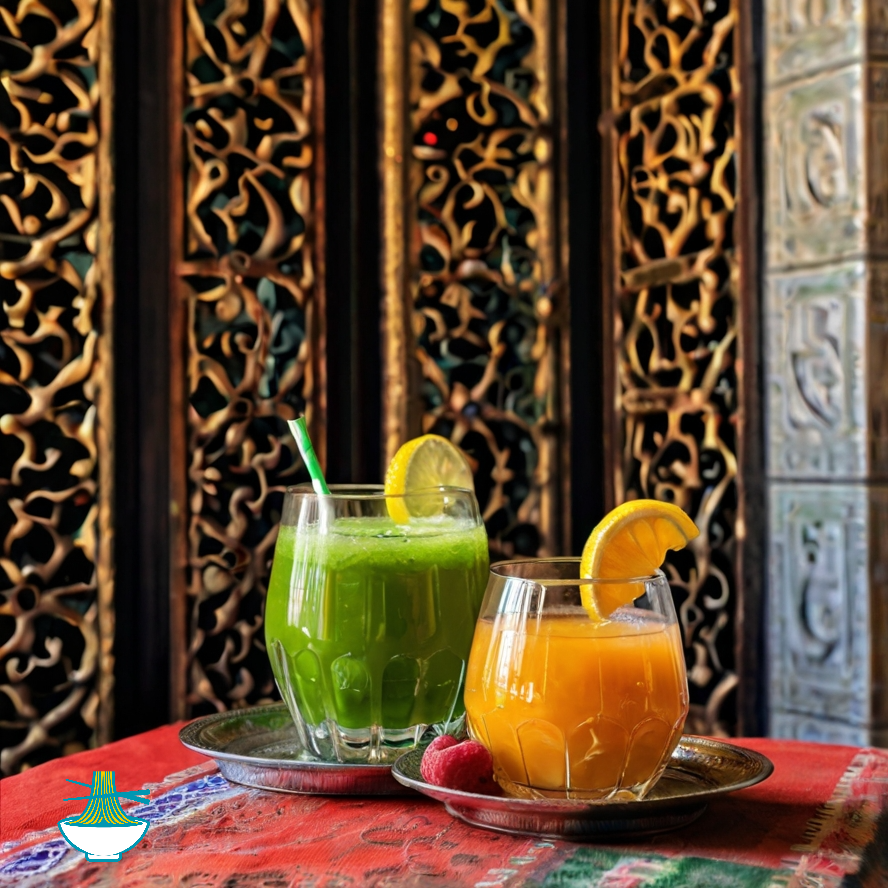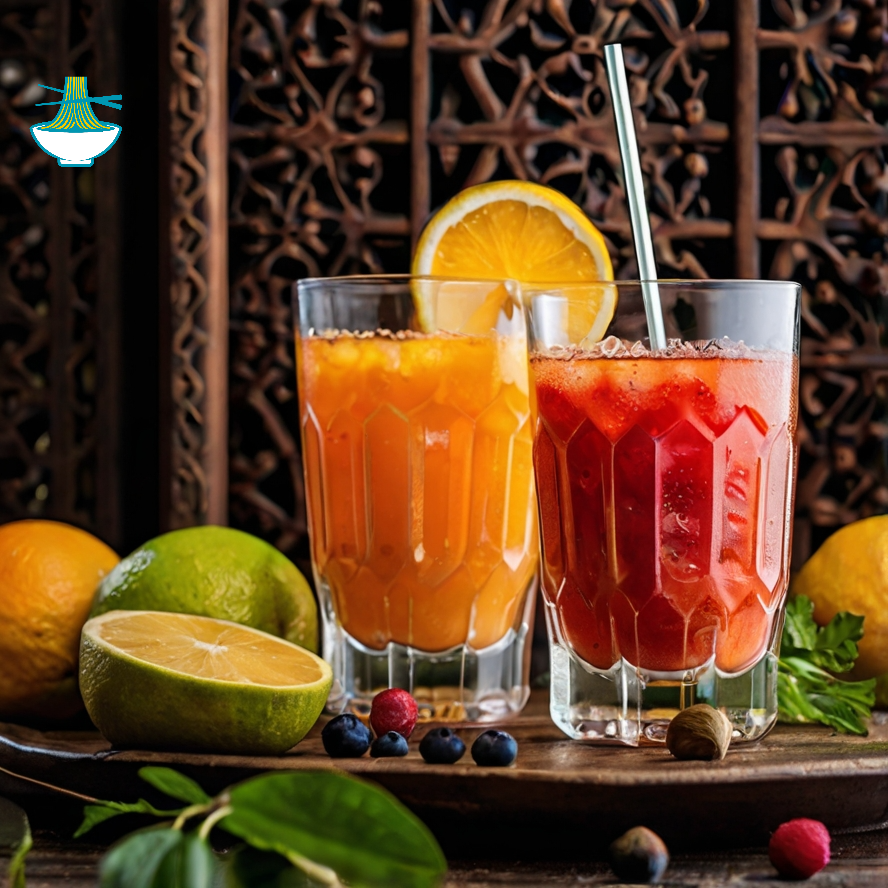Dom and Subia juice is a delightful and healthy drink combination, often enjoyed during Ramadan. Dom juice, made from the Dom fruit, and Subia, a drink made from fermented barley or rice, come together to offer a unique and refreshing taste. Both drinks are rich in vitamins, antioxidants, and essential minerals, making them excellent for rehydration and boosting energy levels. Dom juice is known for its cooling properties, while Subia offers a natural source of probiotics that promote gut health. This drink combo is a perfect way to replenish your body after a day of fasting, providing hydration and nourishment in one glass.
Ingredients:
- 1 cup Dom fruit
- 4 cups water
- 1 cup Subia (fermented barley or rice drink)
- 2-3 tbsp sugar (optional, adjust to taste)
- 1 tsp rose water (optional for fragrance)
Instructions:
1. Prepare the Dom Juice:
Soak the Dom fruit:
- Start by soaking the Dom fruit in water for several hours or overnight. This allows the fruit to soften, making it easier to extract the juices and blend it into a smooth texture.
Remove seeds:
- Once the Dom fruit has softened, carefully remove the seeds from the fruit. This step is essential to ensure your juice doesn’t have any seeds that could affect the texture.
Blend the fruit:
- Place the peeled Dom fruit into a blender. Add 4 cups of water to the blender and blend until smooth. If you prefer a smoother texture, you can strain the mixture through a fine mesh sieve to remove any pulp.
2. Prepare the Subia:
Using ready-made Subia:
- If you’re using store-bought Subia, pour it directly into a bowl. It’s ready to be mixed with the Dom juice in the next step.
Making Subia from scratch:
- If you prefer to make Subia from scratch, begin by soaking fermented barley or rice in water for 2–3 days, allowing the grains to ferment naturally. After fermentation, blend the mixture with water until it reaches a smooth consistency. Strain it to remove any leftover solid particles.
3. Combine the Juices:
- Once both the Dom juice and Subia are ready, pour them into a large jug. Stir well to combine the flavors and create a smooth, refreshing drink.
4. Sweeten the Juice (Optional):
- Taste the juice, and if you prefer a sweeter flavor, add 2–3 tablespoons of sugar. You can adjust the amount to your preference. For an added fragrant touch, add 1 teaspoon of rose water. This step is optional, but it adds a floral aroma to the juice that enhances its taste.
5. Serve the Juice:
- Chill the Dom and Subia juice in the refrigerator for about 1–2 hours to let the flavors meld and become refreshing. You can also serve it with ice cubes for an extra cool treat, especially on hot days. This juice is a perfect, hydrating way to replenish your body after a day of fasting or just to enjoy as a healthy, refreshing drink.
Tips for Storing Dom and Subia Juice:
- Refrigeration: Store any leftover juice in an airtight container in the fridge. It’s best consumed within 3–5 days to maintain its fresh taste and nutritional value.
- Freezing: For longer storage, you can freeze the juice in ice cube trays. Once frozen, transfer the cubes to a ziplock bag for future use. Simply thaw or use the cubes in smoothies when needed.
Tips for storing Dom and Subia Juice:
- Storing the Juice: To keep the juice fresh and preserve its nutrients, store it in an airtight container in the refrigerator. It is best consumed within 3–5 days.
- Freezing the Juice: For longer storage, you can freeze the juice in ice cube trays. Once frozen, transfer the cubes to a ziplock bag, and you can enjoy the juice later by simply thawing or using the cubes in smoothies.
- Avoiding Nutrient Loss: When storing, avoid exposing the juice to direct sunlight or leaving it out at room temperature for long periods, as this can cause the loss of vitamins, especially vitamin C.
Frequently Asked Questions (FAQs)
1. Can I make Dom and Subia juice all year round, not just during Ramadan?
- Absolutely! While Dom and Subia juice is a favorite during Ramadan, there’s no reason why you can’t enjoy it throughout the year. Its refreshing taste and health benefits make it a great drink anytime you need a nutritious boost or a cool, hydrating treat.
2. Is this juice suitable for people with diabetes?
- People with diabetes or those on low-sugar diets can enjoy this juice with modifications. Consider substituting sugar with natural sweeteners like honey or stevia, or you could even skip the sweetener altogether. It's important to monitor portion sizes and consult a healthcare professional if you have concerns about blood sugar.
3. How do I make Subia from scratch?
- Making Subia at home involves fermenting barley or rice. You can soak barley or rice in water for 2–3 days, allowing it to ferment naturally. Once fermented, blend the mixture with water, strain it, and your homemade Subia will be ready to use. Some people also add spices or flavorings such as cinnamon or ginger during the fermentation process for added taste.
4. What are the health benefits of this juice after fasting?
- After fasting, your body needs to rehydrate and replenish essential nutrients lost throughout the day. Dom and Subia juice provides a good mix of hydration, vitamins, and minerals. It helps replenish electrolytes, boosts energy levels, and supports digestive health, especially after heavy meals during Iftar.
5. Can I add other ingredients to enhance the health benefits of this juice?
- Yes! You can experiment with different ingredients to boost the juice’s flavor and health benefits. Some suggestions include:
- Mint: Adds a refreshing touch and can help with digestion.
- Lemon or Orange Zest: Provides an extra vitamin C boost and a citrusy flavor.
- Chia seeds or flaxseeds: Add fiber and omega-3 fatty acids to support heart health.
6. What is Dom fruit and what are its benefits?
- Dom fruit (known scientifically as Balanites aegyptiaca) is a fruit native to North Africa and parts of the Middle East. It is commonly used in traditional medicine for its numerous health benefits. Dom fruit is rich in vitamin C, which boosts the immune system, and vitamin K, which plays a vital role in bone health and blood clotting. The fruit also contains essential minerals, including calcium and potassium, that are beneficial for heart and muscle function. In folk medicine, Dom is known for its cooling properties, helping to alleviate heat and reduce inflammation.
7. What are the benefits of Subia in Ramadan?
- Subia, a drink made from fermented barley or rice, is a popular beverage during Ramadan in the Arab world. The fermentation process increases the drink’s probiotic content, which promotes gut health by improving digestion and restoring healthy bacteria in the digestive tract. Since Ramadan is a time when the body undergoes physical stress due to fasting, Subia can play a vital role in maintaining balance by:
- Improving Digestion: Subia contains probiotics that aid in digesting food more efficiently, especially after the long fasting hours.
- Hydration: It helps replenish lost fluids after a day of fasting, keeping the body hydrated.
- Restoring Gut Health: Probiotics in Subia help balance gut flora, preventing issues like bloating or indigestion, which can be common after consuming large meals during Iftar.
8. How much sugar should be added to the juice?
- While the original recipe suggests adding sugar according to taste, it is worth noting that excessive sugar intake can be harmful, especially for people with health concerns like diabetes or those looking to control their sugar levels. Healthy alternatives to sugar include:
- Honey: A natural sweetener that provides additional antioxidants and nutrients.
- Fruit-based Sweeteners: Such as dates or applesauce, which can offer a more natural and nutritious sweetness.
- Stevia: A calorie-free, plant-based sweetener that doesn’t impact blood sugar levels.
It's important to limit sugar intake and consider these healthier alternatives to enhance the drink’s nutritional value.

Nutritional Values and Benefits
Dom Fruit (per 100g)
- Calories: 170
- Carbohydrates: 44g
- Protein: 2g
- Fat: 0g
- Vitamins:Vitamin C: 15mg (25% DV)
- Vitamin K: 50mcg (40% DV)
Nutritional Benefit: Dom fruit is an excellent source of vitamin C, which helps boost immunity and skin health. It also contains vitamin K, supporting bone health and blood clotting. The fiber in Dom helps with digestion, making it great for gut health.
Subia (per 100ml)
- Calories: 60
- Carbohydrates: 12g
- Protein: 1g
- Fat: 0g
Nutritional Benefit: Subia is rich in probiotics, which support digestion and gut health. It's also a good source of fiber and vitamins B6 and C, which help maintain energy levels and immune health.
Sugar (per 1 tbsp)
- Calories: 50
- Carbohydrates: 13g
Nutritional Benefit: Sugar provides a quick energy boost, which is important after a long day of fasting. It should be consumed in moderation to avoid blood sugar spikes.
Rose Water (per 1 tsp)
- Calories: 1
Nutritional Benefit: Rose water adds a soothing aroma and has anti-inflammatory properties that can help with digestion and reduce bloating.
Health Benefits of Dom Fruit:
- Rich in Antioxidants: Dom is known to contain powerful antioxidants that help fight free radicals in the body.
- Boosts Immune Health: Thanks to its high vitamin C content, Dom is excellent for enhancing immune system function.
- Promotes Digestive Health: The fiber in Dom aids digestion and helps maintain gut health.
Shared Benefits of Dom and Subia Juice:
- This combination of Dom and Subia provides a healthy and refreshing drink that not only hydrates but also nourishes the body with essential vitamins and minerals.
- Boosts Immunity: Both Dom fruit and Subia offer vitamin C, which strengthens the immune system and helps fight infections, making this juice a great choice for boosting health.
- Gut Health: Subia’s probiotics and Dom’s fiber work synergistically to promote good digestive health, ensuring that your gut functions efficiently after fasting.


Comments